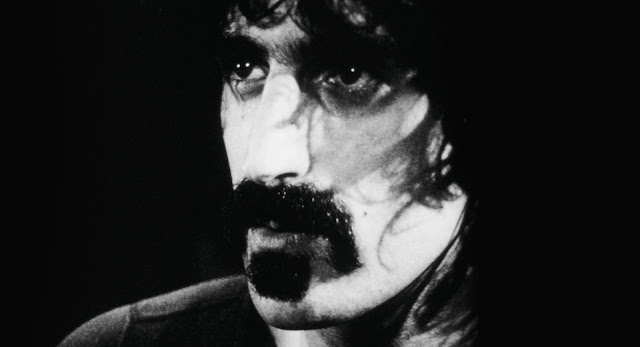Directed by Alex Winter
ChinoKino score: A-
Review by Allan Tong
How to sum up the career of the one of music's most provocative, ornery, diverse and contrary talents in two hours? Alex Winter does a good job capturing one of music's most iconoclastic figures in this new documentary, simply called Zappa. No, Zappa isn't complete. The doc goes easy on Frank's notorious arrogance, and unfortunately leaves much of his early family life--and the forces that shaped his headstrong personality--vague. However, Winter does paint a complex, exciting portrait of a unique talent who still attracts a fervant cult of fans. As Alice Cooper says in the film about FZ, "He had the freaks and the artsy people. Then, he had the whole middle that didn't get it."
I'm no Zappa freak, but I do respect his stature in modern music. It's best to approach this film with an open mind or to know nothing about the man at all. Zappa freaks will probably know a lot of the information disclosed here, like Zappa drumming in an interracial band in the late-1950s when segregation still gripped the United States, or his obscenity bust a few years later (likely a set-up) for making an "obscene" recording when he ran a recording studio.
The meat of the film, of course, is Zappa and the Mothers, his fabled band from the mid/late 1960s, who cut their teeth during a residency at the Garrick Theater in New York. There they mixed free-form rock with jazz and avant-garde classical music and carved a left-field identity for themselves. That identity was an unlikely fusion of vastly different influences. Like many of his postwar generation, Zappa was a bright, white kid who was hip to the blues, but he also fell in love with Edgard Varese, the dissonant 20th-century composer whom Zappa adored like Keith Richards worshiped Chuck Berry. Like his hero, Zappa never gave a damn about reaching mainstream success and stubbornly followed his own drummer until his premature 1993 death from prostate cancer.
The second half of this film explores Zappa as composer, gaining respect in concert halls around the world. The film includes a chapter on Zappa battling American censors, the PMRC of Washington, in the mid-1980s. Meanwhile, along with the Velvet Underground, Zappa was revered by the Czechs covertly under Communism. After the Berlin Wall collapsed, invited him to play as their guest of honour in June 1991. The gig was one of his last playing guitar and this footage poignantly bookends the film.
Winter artfully blends various Zappa interviews with various stock footage that captures the improvisational, sometimes jarring feel of Zappa's music. Winter also weaves interviews with some of Zappa's former bandmates recorded over the years, especially Ruth Underwood, who offers clues to the darker side of their bandleader. Underwood adored Zappa, though admits he had a "cruel" side. Another musician speculates that maybe Zappa grew up in a cold family environment. However, the film doesn't dig deeper than that, perhaps because one of Zappa's children is producers of this film. Then again, Zappa's estate granted Winter access to his extensive archives.
Despite that, Winter's film opens a window to a unique musician and powerful personality that fortunately avoid turning into another rock hagiography.
Zappa premieres on Nov. 27 at select theatres in Canada, on Apple TV and as a digital rental.

No comments:
Post a Comment